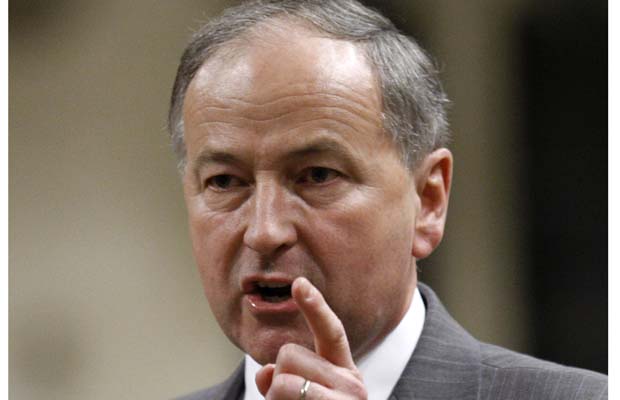
Canada's Justice Minister Rob Nicholson, shown here in a March 2009 file photo, says Canada needs more judges.
Photograph by: Chris Wattie, Reuters
Canada's Justice Minister Rob Nicholson, shown here in a March 2009 file photo, says Canada needs more judges.
Photograph by: Chris Wattie, Reuters
Nicholson was responding to an emotional plea from a Canadian lawyer who, with the support of the Canadian Bar Association, urged Nicholson to reject a Conservative MP's private member's bill introduced in June that called for "equal shared" parenting.
"Will you stand up for children and oppose this private member's bill?" asked Meg Shaw of Kelowna, B.C.
Nicholson said the government hasn't taken a formal position on the bill introduced in June by Saskatchewan Tory MP Maurice Vellacott, but the minister made his personal position crystal clear.
"I believe, and I think most people who have been involved in family law or studied this, that the best interests of the child are always paramount . . . and should be," he said, triggering applause from several hundred lawyers attending the CBA's annual meeting in Ireland's capital.
Vellacott's bill, according to a news release issued by the MP, instructs judges "to apply the principle of equal shared parenting unless it is established that the best interests of the child would be substantially enhanced by allocating parental responsibility other than equally."
The news release said research shows, "with limited exceptions," that "children generally demonstrate superior outcomes when both parents — mom AND dad — are actively involved in their children's lives, even if the parents divorce or separate."
Liberal MP Brian Murphy, deputy chair of the House of Commons justice committee, and association president Guy Joubert both praised Nicholson for making his own views clear.
Shaw, in her question, said Vellacott's bill "seems appealing," but said that experience in other jurisdictions shows that a shift in focus would mean children wouldn't be adequately protected.
Nicholson also won praise for saying that Canada needs more judges.
"As I point out to my colleagues, the country keeps getting bigger, the issues are getting more complicated, and you know there are more demands" on the justice system, Nicholson told CBA members.
"We need to have more judges."
The minister, who was being asked about inefficiencies in Canada's family court system, acknowledged that there was a particular problem in the Canadian North.
He noted that a bill passed last year was the first piece of federal legislation to increase the number of judges since 1991.
Nicholson was referring to an amendment to the Judges Act that expand by 20 the number of provincial and territorial superior court judges across the country as part of a plan to reduce backlogs.
Murphy, who is attending the CBA conference, said Canada needs more and better-trained judges, particularly in areas such as family law and in complicated areas like Internet crime and intellectual property litigation.
"Access to justice is a multi-faceted challenge. Having more judges is only one aspect to gaining better access and more efficiency in the system," Norman Sabourin, executive director of the Canadian Judicial Council, said in Dublin.
"As cases become more complex and more difficult, in some instances, the number of judges might not be sufficient."
There are approximately 1,070 federally appointed judicial positions, according to the Canadian Judicial Council.
Several lawyers who grilled Nicholson on other matters, such as the government's new policy on clemency for Canadians facing the death penalty in foreign countries, were less satisfied.
The minister said he'd pass on the association's objections to that policy, which was described here Sunday as unprincipled and inconsistent, to Foreign Affairs Minister Lawrence Cannon, whose department issued the policy statement.
Nicholson also wouldn't say whether the government would accept or challenge a Federal Court of Appeal ruling Friday ordering Ottawa to make diplomatic efforts to repatriate accused terrorist Omar Khadr from the U.S. military prison in Guantanamo Bay.
The CBA has been pushing Ottawa to return Khadr to Canada.
One Halifax lawyer, Joel Pink, complained that the Harper government's various bills setting minimum sentences may be popular with the public but are causing overcrowded prisons and not protecting Canadians.
"Why is your government so vigourously pursuing measures that promote neither justice nor public safety and at such enormous expense to taxpayers?"
Nicholson responded that the government has the obligation to give both guidance to judges and to protect victims.
With a file from Amy Minsky